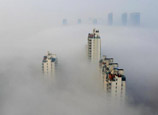
Ma Jun, chief economist at Deutsche Bank in China, said the nation's GDP growth will recover modestly to 8 percent in the first half of 2013 and accelerate to 8.5 percent in the second half, benefiting from corporate and infrastructure investment and a recovery in export growth in the second half of this year.
Ma said the economic recovery will continue in 2014 and GDP growth will likely peak at close to 9 percent.
"Indications of more extensive economic reforms ahead will be fruitful, and we expect investment-led growth recovery in 2013," he added.
Regarding monetary policy, Deutsche Bank's expectation is that interest rates may begin to rise by the end of 2013, and that renminbi appreciation against the dollar will reach 2.5 percent by the end of the year.
Ma also outlined structural themes that investors should consider in 2013. For example, cement, construction, and shipping companies will likely outperform other companies, as 2013's cyclical recovery will mainly be led by investments and exports.
Resource price reforms may be carried out, and the power, gas, water and refined oil sectors will be the main beneficiaries of such initiatives, he said.
"The downside risks include a stalemate on the US debt ceiling, geopolitical risks in the Middle East and an escalation in tensions between China and Japan. The main upside risk in China is higher-than-expected fiscal spending by the government," said Ma.

















 Extinction of river dolphin: What does it mean for the Yangtze River?
Extinction of river dolphin: What does it mean for the Yangtze River?


![]()
